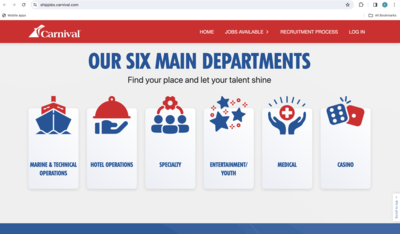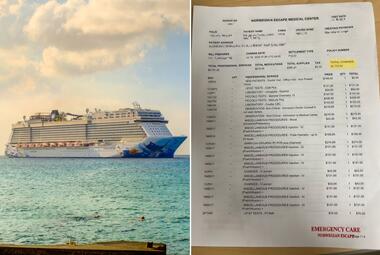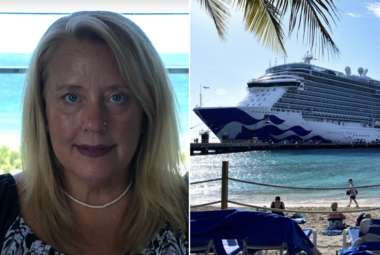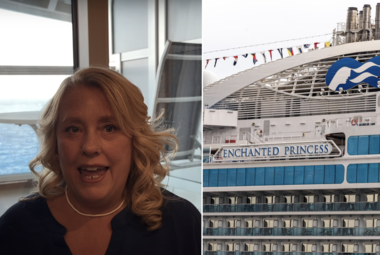Cruise ships aren't just engineering marvels; they're also the home to the thousands of crew members who work onboard the ship to ensure that you have a memorable vacation.
Since ships are essentially floating cities, there are all different types of jobs onboard, ranging from, of course, the Captain to nurses, cabin stewards, bartenders, photographers, electricians, and more.
Whether you've decided life at sea is for you or simply want a new experience while seeing a little bit more of the world, securing a job on a cruise ship is rather attainable if you know where to start.
First things first, you need to know your strengths

Before you can apply to work on a cruise ship, you need to evaluate your skill set. Those who have experience in the hospitality industry, whether as a server, bartender, hotel manager, etc., will have an easier time getting hired since, as mentioned earlier, cruise ships are floating cities.
According to Pro Sea Staff, an authorized recruitment agency, most entry-level positions require at least two years of professional experience. Plus, applicants must be 21 years of age and have strong English-speaking skills. You'll also need a valid passport.
If you're trying to work onboard as a performer, competition will be a little tougher, especially if you're hoping to work on one of the newer ships in a more elaborate show, like Icon of the Seas' Wizard of Oz or Norwegian Viva's Beetlejuice. Jobs like cabin stewards, deckhands, and servers are going to be more attainable.
Once you have narrowed down the sector you'd like to work in, you can begin searching for open positions.
You can find job listings directly through cruise lines and agencies/contractors

If you search "Royal Caribbean job openings" on Google, the very first result is for the homepage of RCB (Royal Caribbean Group) Careers. From there, you can navigate to a specific line (i.e., Royal Caribbean, Celebrity Cruises, or Silversea) or simply select "search shipboard careers" to get an overview of all the offerings.
For RCG, their jobs are divided into three different sectors — hotel, marine, and private destination — each of which has numerous sub-categories.
"Carnival Cruise Line jobs" has a similar result, with the homepage to their jobs page coming up first. If you scroll down, you can immediately view what's available on land and at sea. If, however, you have the desire to work on a cruise ship, simply select "search shipboard careers."

Carnival has six main departments — marine & technical operations, hotel operations, specialty, entertainment/youth, medical, and casino — whereas Royal Caribbean Group has three. They'll even tell you what roles are in demand!
Cruise lines also recruit through agencies, particularly when searching for entertainers. If you're hoping to dance your heart out on stage in front of a live audience at sea, make sure that your cover letter is up to date. It doesn't hurt to have a video of your work on hand, too. If you're accepted by the agency, they'll inform you about any openings.
Be aware of fraudulent agencies, though. Princess Cruises' became aware of fake entities trying to represent them, so they listed some of their authorized recruitment partners from around the world on their site, such as Caribbean Cruise Careers, Cast-A-Way, Cruise Academy UK, Excite Recruitment, Pro Sea Staff, and Zest Recruitment.
How long are cruise ship job contracts?

The length of contracts varies based on position. According to RCG Careers, a contract will range anywhere from three to roughly eight months: "Most senior management roles have 4-month contracts while most of the rest of the positions have 6-8 month contracts. Employees live onboard for the total length of their contracts."
Norwegian Cruise Line states that most assignments are between four and nine months; however, on Pride of America, entry-level positions work up to five months with a scheduled, unpaid vacation, while management-level positions work onboard for four months before receiving a paid vacation.
Moreover, while onboard, it is likely that you will not be working a standard 9-5 job. Instead, many crew members work long hours. This makes sense when you think about how late some venues are open, such as the casino, bars, youth clubs, etc. Many positions require you to work well over 40 hours per week.

Suffice to say, if you want to work onboard a cruise ship, you'll have to be okay with spending lengthy amounts of time away from home, sometimes in different time zones!
What's the pay like?

Compared to many land-based jobs in the United States, the pay is relatively low; however, it's important to consider that while onboard, you'll have free room & board (including utilities and electricity), as well as included meals, meaning that your overall expenses should be pretty low.
What you're paid is determined by a lot of factors, according to TikTok user Kaitlyn Rawls. Your position, expertise in a specific area, nationality (i.e., dollars vs Euros), and previous contracts are all taken into consideration when you're given an offer. She states that during her first contract, she was making $1,350 per month.
Of course, it really does come down to what your position is, as Cruise Directors will make far more, as well as, of course, Captains!
When it comes to wanting to work on a cruise ship, you need to consider your personality, as well as your past experience

The majority of crew members have to maintain a positive attitude throughout daily interactions with guests. As such, if you're someone who gets easily frustrated, it probably isn't the job for you. This is why experience in customer service/hospitality is usually required and will give you a leg up over other applicants.
Additionally, the demands while onboard can be strenuous. While there are many benefits to working on a ship (i.e., reduced living expenses, the ability to travel the world, etc.), they do come at a price. Those who enjoy relaxing weekends will find that working on a ship is a 7-day job. There are always passengers onboard who need tending to, whether it's 6:00pm on a Tuesday or 10:00am on a Sunday.
While that doesn't mean that you won't get time off, you shouldn't expect to sign a contract thinking you'll travel like guests. Sometimes, you'll have to stay onboard when the ship is docked, whereas other times, you will only have a few hours to explore.









